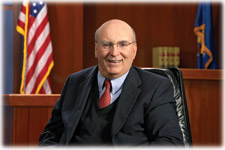 Wisconsin Lawyer
Wisconsin Lawyer
Vol. 79, No. 12, December
2006
Open Up the Supreme Court
It's time for the Wisconsin Supreme
Court to hold all its conferences in public -even those in
contested appeals.
by Steve Levine
 In the wake of the Watergate scandal of the early 1970s,
states raced to pass laws that would make the world safer for democracy.
Open meetings and open records laws were thought to be an antidote to
corruption in government by providing "transparency" and by
educating the public about the doings of its governmental officials.
Wisconsin joined the movement in 1976 by creating Wis. Stat. sections
19.81-19.98 - Wisconsin's Open Meetings Law. Any new law has to be
fleshed out by court decisions, and the Wisconsin Supreme Court joined
the bandwagon with some strongly worded opinions extolling the virtues
of open government for every thing from state agencies to municipalities
- but not for itself.
In the wake of the Watergate scandal of the early 1970s,
states raced to pass laws that would make the world safer for democracy.
Open meetings and open records laws were thought to be an antidote to
corruption in government by providing "transparency" and by
educating the public about the doings of its governmental officials.
Wisconsin joined the movement in 1976 by creating Wis. Stat. sections
19.81-19.98 - Wisconsin's Open Meetings Law. Any new law has to be
fleshed out by court decisions, and the Wisconsin Supreme Court joined
the bandwagon with some strongly worded opinions extolling the virtues
of open government for every thing from state agencies to municipalities
- but not for itself.
In 1980, an effort began to have the court itself meet in public when
it conferred on what were called legislative issues - regulation of the
Bar, rules of professional conduct, any decision not made in a contested
appeal. After 15 years of resistance, the court agreed to experiment
with open conferences in 1995 and then made the change permanent a year
later. Today, after every public hearing on rulemaking matters, the
court's conferences are held right in the courtroom, open to the public.
Open rulemaking conferences have become an integral part of the court's
decision-making process. Now it's time for the court to open its doors
all the way by holding all its conferences in public, including
those involving contested cases. To maximize public access, the
conferences should be broadcast by the new WisconsinEye public
television network and via the Internet.
While other public bodies make law by approving statutes, ordinances,
and resolutions, the Wisconsin Supreme Court makes law by deciding
cases. Opening the court's conferences on contested cases would educate
both lawyers and the public in general about how the process works. And
it would provide voters with a better basis for making choices in
supreme court elections. Given some of the complaints we heard during
the 1990s about incivility during court conferences, opening them to the
public might improve the environment and enhance the public's confidence
in its legal system. Open conferences are worth a try, so here is a
formal request to the supreme court to open all its conferences to the
public for a one-year test period. Try it; you may like it.
Is there a down side to opening up all supreme court conferences?
Would justices play to the cameras, or conversely, would open meetings
stifle free and full debate and discussion? I haven't seen either during
the court's open rulemaking conferences, and I haven't seen that at the
state Public Service Commission, where contested cases have been decided
in public since right after the Open Meetings Law was passed. It may
happen, but we won't know unless the court gives it a try.
It took 15 years for the supreme court to open its rulemaking
conferences, so opening the rest of them won't happen overnight. But we
can all help by writing or emailing the court urging it to do so. (The
best time to do this is right before your next supreme court argument -
a sure guarantee of winning your case.) The Wisconsin Legislature can
pitch in by offering financial incentives in the court's next budget or
by sponsoring a constitutional amendment requiring the court to open all
its conferences. Perhaps the best way would be for a candidate to raise
the issue in a supreme court election. (You may wish to ask the
candidates in next April's race where they stand on the issue.) The
public may not be that interested in joint and several liability, but it
certainly understands the importance of open government.
Please feel free to contact me at steven.levine@charter.net.
Wisconsin Lawyer
